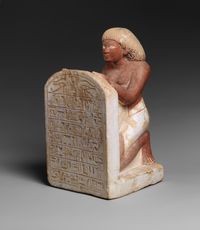
Funerary Cone of Pa-Aten, Scribe of the Granary and Breads
An item at Metropolitan Museum of Art
This funerary cone is inscribed for a man named Pa-Aten who was scribe of the granaries and bread. Funerary cones were used as architectural decoration for the facades of tombs and the are often found in multiple examples (see also 09.185.26a). For a drawing of this impression, see The world of funerary cones and stamped bricks, no. 561.
Egyptian Art
An exhibit at Metropolitan Museum of Art
The Met collection of ancient Egyptian art consists of approximately 30,000 objects of artistic, historical, and cultural importance, dating from about 300,000 BCE to the 4th century CE. A signifcant percentage of the collection is derived from the Museum's three decades of archaeological work in Egypt, initiated in 1906 in response to increasing interest in the culture of ancient Egypt.




